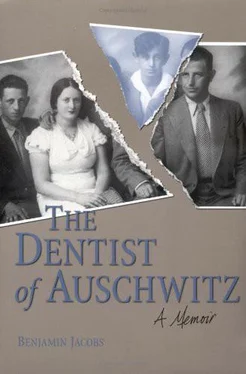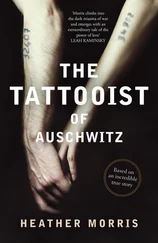However fortunate we were to come out of the hell below, safety was still far away. The Cap Arcona was tilting, and we saw no one coming from shore to help. What’s more, not a single lifeboat or life vest was on the ship.
Death stared at us. Pandemonium had erupted, and the bay was full of swimmers. Many more were jumping into the frigid water. Those near the ship were getting nowhere. The downward pull of the sinking ship created a whirlpool, and the swimmers’ chances of survival were slim. Physically exhausted and no match for the elements, they struggled in vain, and one after another sank below the waves.
Suddenly from an empty sky planes appeared. We could clearly see their markings. “They’re British!” we shouted, and we waved and screamed up to them. “See, we are KZ-nicks! We are concentration camp inmates!” We waved our striped caps at them and pointed at our striped clothes, but there was no mercy. They dropped napalm, as the Cap Arcona shook and burned. On their next pass they came within fifteen meters of the deck. We could see one pilot’s face, and we thought we had nothing more to fear. But in that instant his plane’s belly flaps opened again, and more bombs flew down. We could track each one as it fell and on impact sent sections of the deck flying about. Other bombs missed us and fell into the sea, creating fountains of water splashing over us. Machine-gun bullets sprayed us and those trying to save themselves in the sea, and then the water turned red as bodies disappeared beneath the waves.
We were terrified as the ship tilted still more. The deck surface was smooth and wet, and we could no longer stand upright. We sat at the edge and held on to the railing. The sea around us was filled with people struggling and losing their battle to survive. Escaping the turbulence of the whirlpool was nearly impossible. The few that managed to get out of the whirlpool were so weakened that they soon vanished under the churning waters as well. It was three in the afternoon. The visibility was good, and we clearly saw the shore. We hoped that someone from shore would come, perhaps to rescue the Cap Arcona ‘s crew, and we could get help. Surely they wouldn’t ignore their own people, we thought.
The Cap Arcona was tilted about thirty-five degrees into the water. Our hope of rescue was fast fading. In spite of what everyone saw happening around us, people were still jumping overboard, expecting a miracle. Then the explosives on board were ignited. My brother and I sat holding a railing post between our legs so as not to slide off the deck. Then flames shot up over our heads. Fragments of the deck were breaking off after each bang. The inferno was thorough. We could no longer hang on.
Josek and I stared at one another and looked toward the shore. I knew that he could not help me, nor could I help him. Josek could not swim. And he knew that he would never make it, trying to swim to shore. Each of us had to make his own decision. I looked at the clear, cold, and hostile sea, and every part of me shivered. We were rapidly sinking. Few people were left on deck. The sailors and some SS men were still there. Had they figured out a way to escape this nightmare? If they had, they did not share it with us. I looked to the heavens and asked why this was happening.
It was about four o’clock when I saw David Kot tie a rope to the ship’s railing and slide down into the water. When I looked down at him, he shouted up, “Come on down! The rope is strong. Down here we’ll have a better chance of being picked up.”
I was convinced. But before I decided I thought of my brother. We had survived so much together. I tried to get Josek to come with me. I told him that the planes and explosions on the boat would surely kill us. But Josek, afraid shrugged his shoulders. I understood his apprehension. “Berek, you go,” he said. “Perhaps you’ll get help for us out there. I will stay here and wait.” By then several people were hanging on to the rope, and more were eying it, believing it to be the miracle escape route. There was little I could do to persuade my brother. I took a last look at him, quickly turned my head, and followed Viky Engel down the rope.
I reached bottom. Seven of us were hanging on to the rope and bobbing in the water. The water temperature was cold—only about seven degrees Celsius. My jacket and shoes were soaked and heavy, and I had to take them off. Viky said that his brother, Willy, had left the ship some time ago and swum to shore. He thought that Willy was a good swimmer and that he would make it if anyone could. Desperate people seeking safety continued to slide down the rope. It was strong, but all ropes have their limits. We were nine, and more were coming. When the tenth person climbed on the rope, it stretched and crackled. “No more!” we shouted up. “The rope will tear.” But there was a stampede on deck, and people kept sliding down. I knew the rope would not last much longer. I was wearing trousers, a shirt, and a black short-sleeved sweater. I took off my trousers and let those go as well. With them went the kilo of dental gold. Now I had only my shirt, sweater, and underwear.
People still kept coming and sliding down the rope. With about fifteen holding on, the rope began to untwist. Then it snapped and tore. We all plunged down deep into the dark cold sea. It tumbled and churned, as if we were in a giant washing machine. I had no air. I struggled, my lungs bursting. Finally I surfaced and was able to stay up. David Kot was battling the sea. He couldn’t stay on top. He went down, came up thrashing, and went down again with a gurgling sound. This time he vanished for good. Four others who had held the rope with me managed to stay afloat only a few minutes before they too drowned. I knew I would not get very far if I tried to swim to shore. Flinging my arms and kicking hard with my feet, I swam back to the ship. There I could escape the downward pull of the current. Then I moved along, holding onto the ship’s hull, until I managed to reach the stern. There I held on and watched.
Hundreds of people were fighting death in the heartless cold waters of the sea. Then suddenly, I saw an object bobbing thirty meters from the ship. It was a small bit of wood. That gave me a new determination. I pulled off my sweater, shirt, and underwear. Naked, mustering all my strength and resolution, I began to swim for it. Every stroke was a major effort. Once I was outside the drag of the whirlpool, swimming was easier. When I came close to the wood, I could see that it was a piece of the ship that had blown free in an explosion. I grabbed it and held it tightly under my chest. “We’ll both have to make it to shore, or both go down,” I mumbled. “I will not let go of you until you save me.”
I alternately kicked with my feet and threw my arms forward. Hard as I tried, the meter-high waves seemed to pull me up and down and keep me in the same place. I realized that I lacked the strength to make it to shore. Then I saw a small boat slicing slowly through the sea. I thought of changing direction and swimming into its path to intercept it. I redoubled my efforts. I stretched and kicked, but in spite of this I fell short. It was a four-meter boat filled with naked men. I knew it would pass before I could reach it. I wasn’t the only one struggling in the water. Some were closer to the boat’s path. I feared this was the end. I heard people begging to be picked up. As a man was pulled up, I waved and yelled to get their attention. “We can’t take anyone. We have no more room! We are full!” they shouted back to me. But that did not deter me. In a final effort, I lurched, throwing my arms forward to get a bit closer to them. Then I saw how low their boat was in the water, just barely above the waterline. I begged and pleaded with them until I could shout no more. “It’s Bronek, the dentist. Let’s try to take him,” someone yelled. The motor slowed, and the boat turned and pushed in my direction. A minute later a few hands pulled me into the boat. I slumped down, barely conscious. The naked comrades and the sunburned fisherman were my archangels. As the little boat slowly plowed the waters toward the shore, many people were begging to be picked up. “If we take one more, we’ll all go down,” the fisherman cautioned.
Читать дальше












